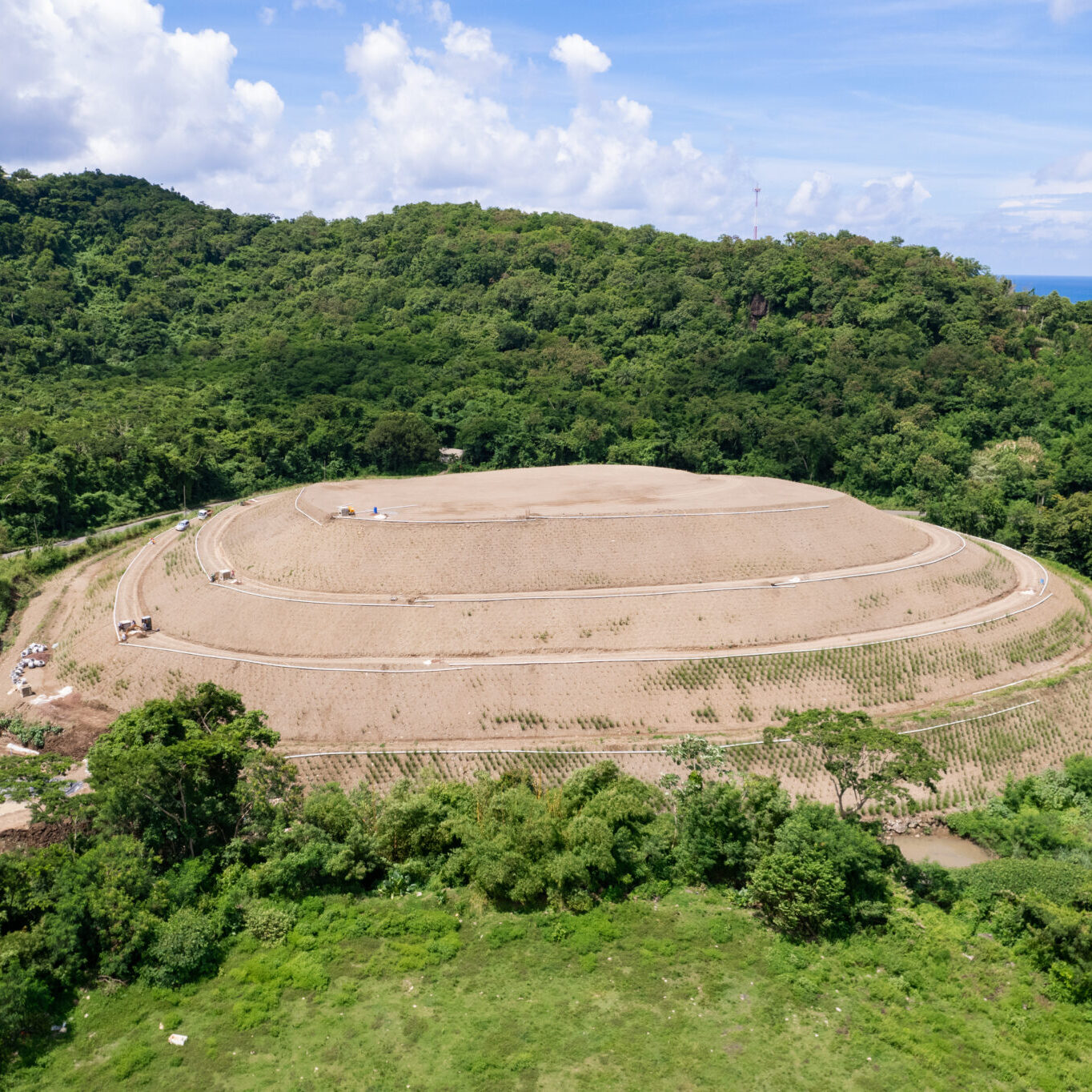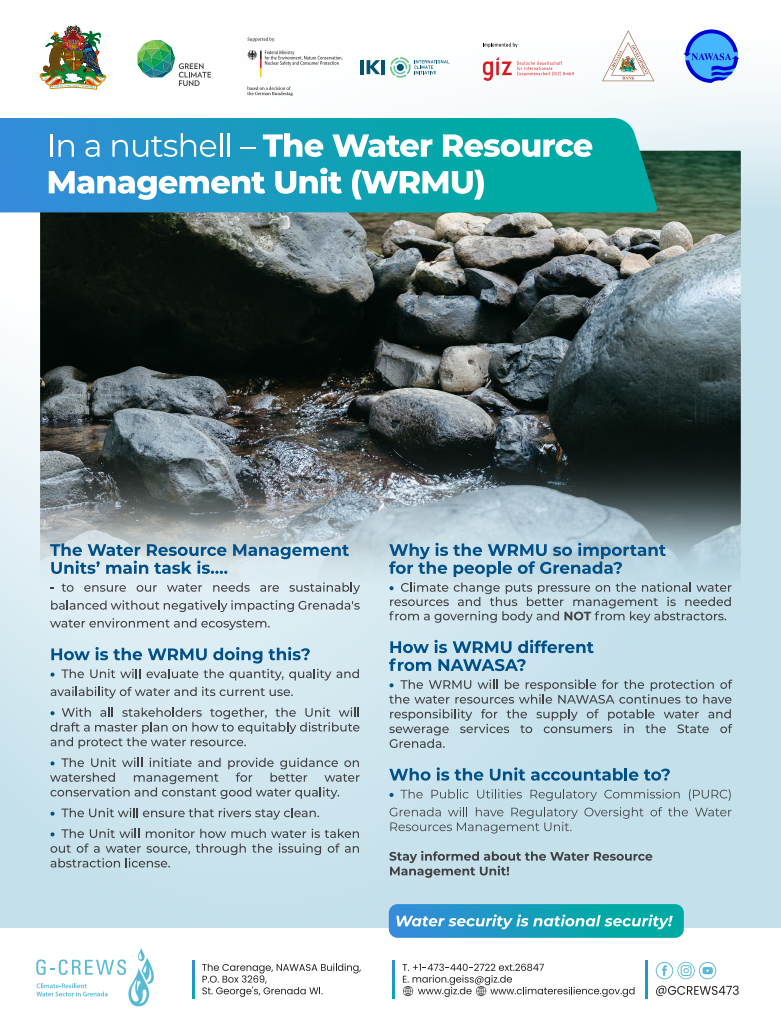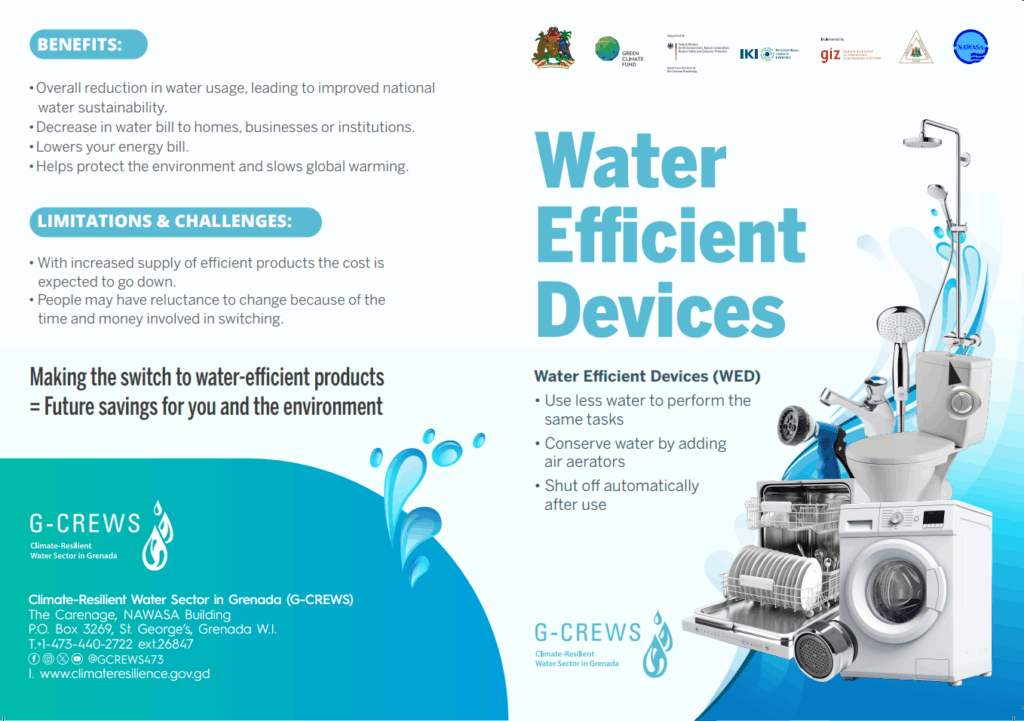
Challenges and Opportunities
Challenges
Grenada’s solid waste management sector faces several key challenges:
Climate Change Impacts: Increased storms, hurricanes, and flooding, driven by climate change, place additional stress on existing waste management systems. Flooding can disrupt landfill operations and cause solid waste to contaminate natural environments, including watersheds, waterways and coastal areas.
Limited Landfill Capacity: The Perseverance Landfill is nearing capacity, creating an urgent need for new solutions or sites, which is difficult given Grenada’s limited land availability due to its small size and steep terrain. In 2017, a fire erupted at the landfill which lasted for over 2 years fuelled by the methane gas emanations from the landfill, a greenhouse gas 86 times more potent than carbon dioxide, making it a powerful contributor to the climate crisis.
Marine Pollution: As an island nation, marine pollution, particularly from plastics, is a major concern. Improper waste disposal contributes to the degradation of marine ecosystems, harming biodiversity and impacting the fishing and tourism sectors.
Inadequate Recycling Infrastructure: While Grenada has made strides in banning certain non-biodegradable products, its recycling systems remain underdeveloped, and public awareness around recycling is still limited.
Opportunities
Grenada has several opportunities to enhance its solid waste management system considering the challenges posed by climate change:
Participation in the Recycle OECS Model Demonstration Project: Grenada is part of this project, which aims to establish a regional framework for recycling in the Organization of Eastern Caribbean States (OECS) through capacity-building and public education campaigns. This initiative creates an opportunity for Grenada to develop an integrated recycling system and strengthen its waste management practices.
Waste-to-Energy Initiatives: The development of waste-to-energy technologies can help reduce the strain on landfills while contributing to Grenada’s renewable energy goals.
Resilient Infrastructure Investment: Building climate-resilient waste management facilities, such as flood-resistant landfills and waste transfer stations, can protect Grenada’s waste systems from extreme weather events.
Non-Biodegradable Waste Control Act of 2018: This act, which bans single-use plastic bags, styrofoam containers, and straws, provides a significant foundation for reducing plastic pollution. By expanding this law and strengthening enforcement, Grenada can further minimize plastic waste and protect marine environments.
Sector's Governance
Several entities are responsible for overseeing solid waste management in Grenada:
Grenada Solid Waste Management Authority (GSWMA): GSWMA is the key institution responsible for waste collection, management, and landfill operations. The authority also plays a role in public education and raising awareness about sustainable waste management practices. Since 2014, the authority implements the Integrated Solid Waste Management Project, financed with a loan from the Caribbean Development Bank, this project significantly improves the Perseverance Landfill operations and design, including terracing to avoid land slippage, 6 additional waste cells, a network of storm water and leachate collection pipes, drainage and gas venting system as well as a semi aerobic filling plan, which could reduce air pollution and greenhouse effects by 30%-70%.
Ministry of Climate Resilience, the Environment and Renewable Energy: This ministry coordinates national policies on environmental protection and climate resilience, solid waste being a sector identified in the National Determined Contribution as a sector in which greenhouse gases can be reduced.
Ministry of Health and Social Security: Responsible for ensuring that waste management practices align with public health guidelines, particularly in relation to hazardous and medical waste.
The governance of solid waste management in Grenada emphasizes coordination between these national and local agencies to ensure comprehensive waste handling and climate adaptation strategies.
Policy Framework
Grenada has a well-developed policy framework to guide its solid waste management sector, with the following key components:
Non-Biodegradable Waste Control Act of 2018: This law bans the import, sale, and use of specific single-use plastic products and Styrofoam. It represents a significant effort to reduce plastic pollution and align with Grenada’s broader environmental sustainability goals. This legislation has helped curb the use of harmful materials and limit their environmental impact, especially in coastal and marine areas.
National Solid Waste Management Strategy: This strategy provides a framework for improving waste collection, encouraging recycling, and reducing the amount of waste sent to landfills. It also promotes the sustainable management of hazardous and medical waste.
National Adaptation Plan (NAP): Solid waste management is recognized in the NAP as a sector requiring increased resilience to climate change. This includes efforts to strengthen waste infrastructure to withstand extreme weather events and minimize the environmental and health impacts of improper waste disposal.
Environmental Management Act: This act provides overarching legal guidelines for environmental protection, including waste management regulations. It aims to ensure that waste management practices contribute to both environmental health and public safety.
Second Nationally Determined Contributions: Grenada identified the solid waste sector as one in which investments could contribute to the reduction of the country’s greenhouse gases.
Through these policies, Grenada is moving toward a more integrated and climate-resilient approach to waste management, with an emphasis on reducing plastic waste and improving infrastructure.
Regional and International Agreements
Grenada participates in several regional and international agreements that shape its solid waste management strategies:
Recycle OECS Model Demonstration Project: As a participant in this OECS initiative, Grenada is working to develop a sustainable recycling framework that can be replicated across the Caribbean. The project focuses on building capacity for recycling, reducing plastic waste, and promoting circular economy principles within the region.
Basel Convention on Hazardous Wastes: Grenada is a party to the Basel Convention, which regulates the trans-boundary movement and disposal of hazardous wastes to protect human health and the environment.
Global Environment Facility (GEF) Projects: Grenada has received support from GEF to improve waste management infrastructure, with a particular focus on integrating climate resilience into waste management systems.
Caribbean Environment Programme (CEP): Through this program, Grenada collaborates with other Caribbean nations on environmental protection and sustainable waste management practices.
OECS Environmental Frameworks: As a member of the OECS, Grenada benefits from regional efforts to harmonize environmental policies, including those related to waste management and climate resilience.
These agreements enable Grenada to align its national efforts with regional and global best practices in waste management and climate adaptation.
Current Status of Solid Waste Management in Grenada
Landfills and Waste Disposal
The Perseverance Landfill, the island’s primary waste disposal site, is nearing capacity, raising concerns about the need for new waste disposal solutions. While the landfill is managed by the GSWMA, it is vulnerable to the impacts of climate change, such as flooding and landslides. The government is working to extend the landfill’s life by promoting waste reduction and recycling initiatives.
Recycling Initiatives
Grenada’s participation in the Recycle OECS Model Demonstration Project represents a significant step toward improving the country’s recycling capacity. The project aims to build infrastructure and public awareness around recycling, helping to divert waste from landfills and reduce environmental pollution. The Non-Biodegradable Waste Control Act of 2018 has already contributed to reducing the use of plastics and expanding recycling programs will further enhance waste management practices.
Hazardous and Medical Waste Management
Managing hazardous and medical waste remains a challenge in Grenada. However, the GSWMA and relevant ministries are working to improve waste handling protocols and ensure proper disposal of these materials, reducing risks to public health and the environment.
Marine Pollution and Plastic Waste
Grenada has made progress in addressing marine pollution by banning single-use plastics through the Non-Biodegradable Waste Control Act of 2018. These measures are part of broader efforts to reduce marine litter and protect the island’s coastal and marine ecosystems, which are crucial for tourism and biodiversity.
Public Awareness and Community Involvement
Public awareness of sustainable waste management practices is improving, driven by government campaigns and initiatives like the Recycle OECS project. However, more efforts are needed to encourage proper waste disposal and increase participation in recycling programs, especially in rural and remote areas.
Related Documents
Projects
Sorry, we couldn't find any documents



